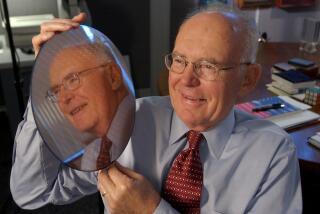Fairchild Deal a Coup for Sporck, National Semi
- Share via
He once told a Senate hearing that the only way to stop unfair competition and save the U.S. semiconductor industry was to beat Japan over the head with a baseball bat until it agreed to fair trade practices.
And he has gone so far as to advocate trade restrictions on the Japanese semiconductor industry because “protectionism beats extinction any day.”
But Monday, Charles E. Sporck, the 59-year-old chief executive of National Semiconductor and an outspoken critic of the Japanese, struck his own blow for a stronger American trade position when his company acquired Fairchild for $122 million--ending any chance that Japanese electronics giant Fujitsu might acquire a share of the industry pioneer.
The acquisition also keeps Fairchild in the Silicon Valley it helped create. That alone represents a psychological boost for an industry just now emerging from a devastating, two-year recession.
Analysts and competitors called the acquisition a personal coup for Sporck, who worked for Fairchild from 1959 until 1967, when he left in frustration over management policies and took over a fledgling and nearly bankrupt National Semiconductor.
W. J. (Jerry) Sanders, a Fairchild alumnus who is chief executive of Advanced Micro Devices, said: “This has got to be an emotional positive for Charlie. I’m sure that Charlie has a special place in his heart for Fairchild. I sure do.”
But analysts said it also was a good deal for Sporck’s company. Said one analyst, “These days you don’t spend $122 million on nostalgia.”
Jack Beedle, president of In-Stat, a Scottsdale, Ariz., market research company, said the new company will be a “world-class player.” By the end of this century, Beedle said, there will be only 10 to 15 surviving semiconductor companies. “Now, National Semi will be one of them.”
Although normally taciturn, Sporck has assumed a high profile in the industry that gave Silicon Valley its name. Flanked by other members of the Fairchild family who have gone on to lead their own semiconductor companies, Sporck has been a forceful spokesman during the industry’s battles with Japanese chip makers.
He was a founding member of the Semiconductor Industry Assn. trade group. Even as his own company was suffering heavy losses, Sporck headed the SIA’s drive to form and fund Sematech, a consortium designed to advance U.S. chip manufacturing processes.
Fairchild, despite its role as granddaddy of many--some say 200--technology firms, has eschewed participation in the industry lobby.
“I knew there had to be a way to get Fairchild into the SIA,” Sanders said. “We need to work together, as a community, to survive.”
Under Sporck’s direction, National has grown from a small manufacturer of transistors to one of the largest high-technology firms in the United States. When he took over, Sporck recalled later, he found National “in very deep trouble . . . in reality, they were bankrupt and didn’t recognize it.”
The firm’s annual sales have risen from $7 million in Sporck’s first year to $1.9 billion in 1987.
The worldwide industry recession, which cost National Semiconductor hundreds of employees and tens of millions of dollars, also hit Fairchild hard. Analysts expected Fairchild to lose another $95 million this year. That made Schlumberger, a diversified oil services company, eager to dump Fairchild and cut its losses.
Fairchild was, nonetheless, attractive to Fujitsu, which was seeking advanced semiconductor technology. Early this year the Japanese firm offered to buy 80% of the company in a deal that analysts said placed the total value of Fairchild at more than $300 million. The deal collapsed in March amid a political firestorm.
Although a National division sells products using computers from Hitachi, another giant Japanese chip maker, Sporck was among those in the U.S. industry who objected to a Japanese purchase of Fairchild. Government officials also opposed the deal, citing national security issues.
Fujitsu dropped its bid for 80% of Fairchild but continued negotiations. More recently, it offered to finance a management-led buyout that would have made the Japanese firm a 25% partner in Fairchild.
That offer was pending when Schlumberger received the National bid two weeks ago.
Sanders said his first reaction to Monday’s announcement was, “My, God, it sure didn’t command much of a price.”
Noting that Schlumberger is planning to take yet another $200-million loss in the quarter because of the sale, Sanders said: “It just goes to show you that (Fairchild management) should have let Charlie run it his way when they had the chance.”
More to Read
Inside the business of entertainment
The Wide Shot brings you news, analysis and insights on everything from streaming wars to production — and what it all means for the future.
You may occasionally receive promotional content from the Los Angeles Times.










